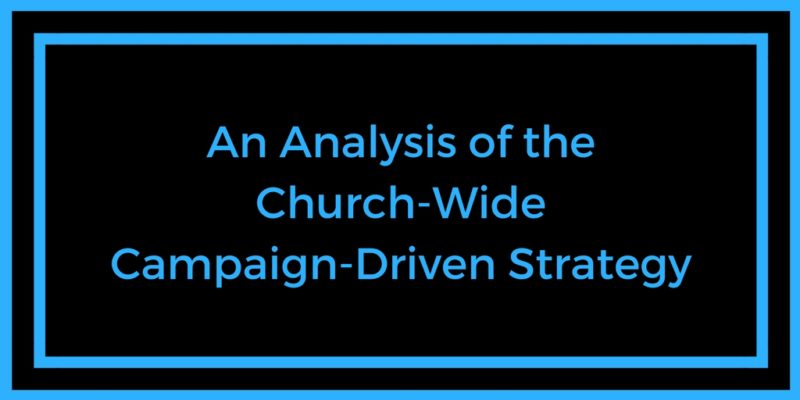An Analysis of the Church-Wide Campaign-Driven Strategy
 An Analysis of the Church-Wide Campaign-Driven Strategy
An Analysis of the Church-Wide Campaign-Driven Strategy
Unlike the Free Market system or the Sermon-Based system (both of which are also very commonly semester systems), the Church-Wide Campaign-Driven strategy is actually part of a system and not the whole shebang.
For example, at Canyon Ridge we use several different strategies designed to connect people to groups over the course of the year. This set of strategies used over the course of the year are all designed to identify new leaders. A single church-wide campaign (typically in the fall) anchors our annual small group strategy. See also, Overview: Here Are Our Four Strategies for Launching New Groups.
A church-wide campaign is not a new idea. Churches have been using church-wide campaigns for many years, primarily as a way to rally the whole church around a vision (often connected with a capital campaign and a building project).
A church-wide campaign, or a spiritual growth emphasis (as Rick Warren refers to them) can be very powerful and do much more than connect adults to groups. Saddleback calls them a spiritual growth emphasis because a well-conceived, well-planned and well-executed church-wide campaign will have a powerful impact on the spiritual vitality of an entire church (from core to crowd and even into the community).
Full Disclosure: I believe a well-conceived, well-planned, and well-executed is the very best way to identify the largest number of leaders, launch the largest number of new groups, and connect the largest number of unconnected people.
Common Distinctives:
Church-wide campaigns have a number of distinctive elements:
- They are alignments between a sermon series and a small group study. That is, what is studied in small groups enhances and reinforces the weekend sermon series.
- Many campaigns include other elements, such as a daily devotional (think 40 Days of Purpose and The Purpose Driven Life), memory verses, serving opportunities, etc.
- While there are many off-the-shelf church-wide campaigns, it is more and more common for churches to develop their own (produced in-house or farmed out to a production company). See also, The Latest on Church-Wide Campaigns – 2016.
- The adult small group study is commonly DVD-driven.
- Many campaigns are developed to include the whole congregation (with materials for children and students, as well).
- Most campaigns include an effort to challenge unconnected adults to join groups that are using the campaign study (where they can get everything possible out of the message series).
- Well-executed campaigns are designed to launch new small groups (and identify new leaders).
Advantages of the church-wide campaign-driven strategy:
Incorporating an annual church-wide campaign into your overall church strategy has a number of advantages:
- It can focus your church on one conversation (children, students and adults can focus on a single topic).
- Well-executed campaigns launch waves of new groups and identify new leaders. In my opinion, it is the very best way to connect the largest number of unconnected people and launch the largest number of new groups.
- Connecting large numbers of unconnected adults into groups can provide an important first step into community.
- Well-conceived and well-executed campaigns leverage the influence of the most influential person in the church (the senior pastor) to encourage whole congregations to participate (i.e, attend all 6 weekend services, be part of a group that’s using the study that goes along with the message series, do the daily devotional, etc.).
- Well-executed campaigns very effectively sustain a large percentage of the new groups launched, helping many unconnected people take first steps into community.
Disadvantages of the church-wide campaign-driven strategy:
- The effectiveness of a church-wide campaign rests largely on the senior pastor’s ability and willingness to play the role of champion. The most effective campaigns leverage the influence of the most influential person in the church to encourage everyone to fully participate. There is no truly effective substitute. See also, Your Senior Pastor as Small Group Champion.
- Choosing the right campaign can be a challenge. Since the topic determines who will say “yes” to leading a group and who will say “yes” to joining a group, choosing a topic that appeals broadly is an essential step. See also, Your Church-Wide Campaign Topic Determines Two Huge Outcomes.
- Church-wide campaigns require full participation and buy-in from senior leadership (senior pastor, staff, elders, etc.). Without full participation and buy-in results in a less successful campaign.
- Effective church-wide campaigns dominate the calendar for 2 to 3 months of the year. Recruiting new leaders and then launching new groups is a 6 to 8 weekend project. Series promotion and execution is typically an overlapping 6 to 8 weekends. See also, Behind the Scenes: Developing a Timeline for Your Church-Wide Campaign.
- Truly effective campaigns are never one of several things being promoted. They are always the only thing being promoted. This aspect necessitates rethinking the way other ministries and programs are launched or promoted.
What do you think? Have a question? Want to argue? You can click here to jump into the conversation.

